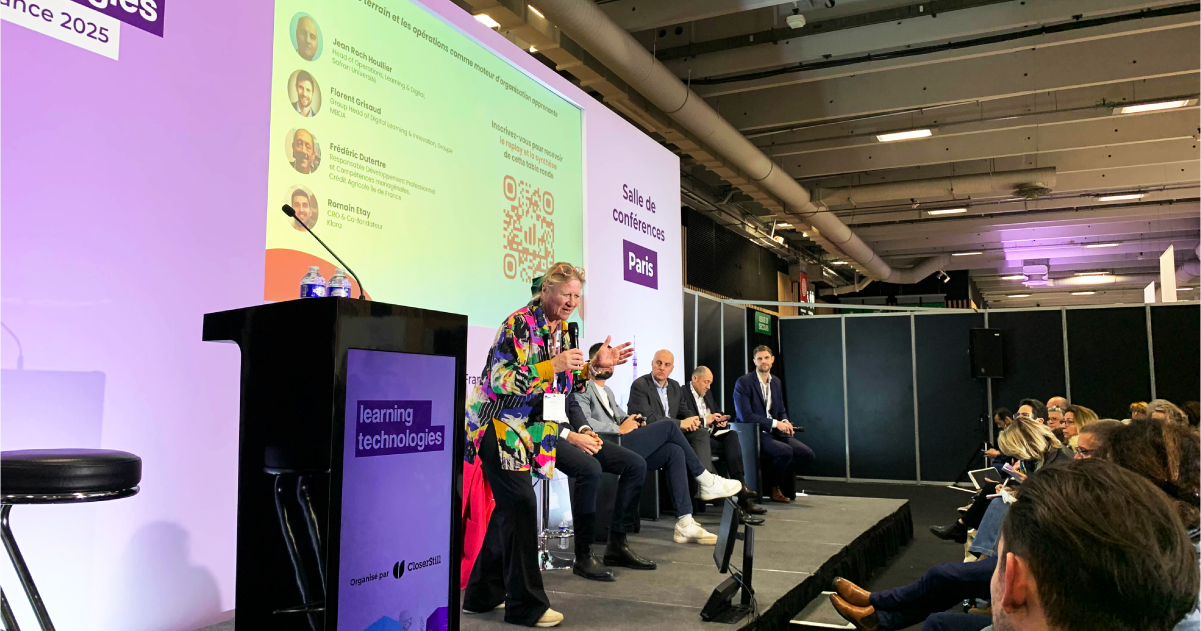The Future of Businesses Lies in Becoming Learning Organisations
The future success of businesses depends on their ability to evolve into learning organisations, where knowledge sharing and skills development are embedded in daily operations. More than just a goal, this approach is a strategic lever for addressing complex challenges while preparing companies for the transformations of tomorrow.
At the Learning Technologies Paris 2025 conference, key trends and practical solutions were discussed to support this dual ambition: engaging frontline employees in learning initiatives and positioning managers as key players in skills development and overall business performance.
Workplace Learning: A Strategic Yet Underutilised Lever
The involvement of frontline teams in learning dynamics remains an area for improvement in traditional training methods. While employees are ideally positioned to identify their own needs, test solutions, and share expertise, they are often left out of conventional learning initiatives. Why? Because these programmes frequently lack practical relevance and fail to integrate seamlessly into their daily work.
To bridge this gap, several key measures should be implemented:
- Digitising workplace learning: A blended approach combining digital tools with human interaction enables businesses to map skills, streamline knowledge transfer, and capture critical learning moments in real time.
- Immersive learning approaches: Integrating training directly into the workplace through collaborative and mentoring practices reduces cognitive load and improves retention.
- Structuring knowledge: Establishing managerial learning practices helps anchor learning into daily operations, making it a lasting component of business processes.
Workplace learning is a powerful driver of engagement and performance. By recognising and leveraging employees’ hands-on expertise, businesses strengthen their internal capabilities and ensure long-term skills sustainability.
The Hybrid Manager: A Catalyst for Skills and Performance
The role of the manager is undergoing a profound transformation. In 2025, they are no longer just operational supervisors but true ‘managers-coaches’, balancing two responsibilities often seen as conflicting: fostering skills development while ensuring performance.
To achieve this, managers must:
- Foster a culture of continuous learning: By embedding open managerial routines that encourage dialogue and feedback, they can co-construct objectives aligned with both operational needs and employee aspirations.
- Leverage the right tools: Digitalising skills tracking is essential to measure the impact of managerial actions and adjust them in real time.
- Promote accountability: Encouraging employees to take ownership of their professional growth by providing the necessary tools and opportunities for skills development.
A successful manager in 2025 is one who aligns team capabilities with strategic business priorities while fostering motivation and engagement.
Measuring Impact: From Training to Organisational Transformation
Skills development should not be seen as an isolated objective; it must be embedded in a broader business performance strategy.
The benefits of a well-executed workplace learning approach include:
- Enhanced operational efficiency: Training programmes that integrate seamlessly into daily tasks help optimise time and boost productivity.
- Stronger employee engagement: Recognising the contributions of frontline teams increases commitment and makes the company more attractive to new talent.
- Greater adaptability: Capturing real-time employee insights and incorporating them into strategic decisions makes businesses more agile.
- Knowledge sustainability: A structured, continuous knowledge-sharing process enriches the company’s intellectual capital and mitigates skill shortages.
For organisations, the real challenge is demonstrating the tangible impact of learning initiatives on business results. This requires shifting from a traditional HR-driven approach to one focused on measurable operational outcomes that meet strategic expectations.
Building the Future: Innovate for Sustainable Performance
A learning organisation is not an end goal but the natural result of the pursuit of performance. By integrating learning into the daily activities of teams, reinventing the role of the manager, and measuring the impact of these practices, businesses are not only preparing to meet current challenges but also to anticipate future changes.
To build such a future, the collective commitment of all stakeholders – managers, frontline employees, and HR teams – is essential.
Let’s continue to innovate and make learning a driver of sustainable performance!

